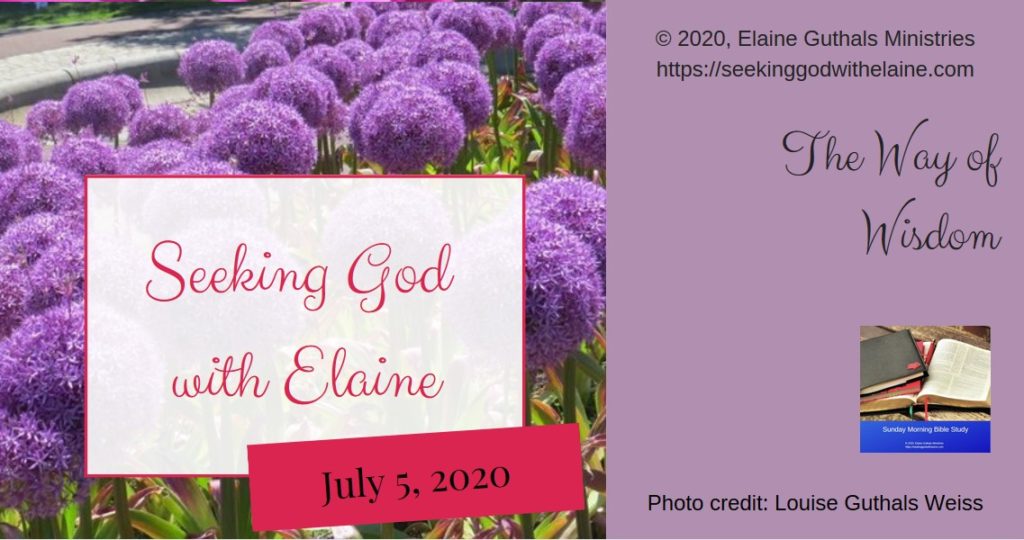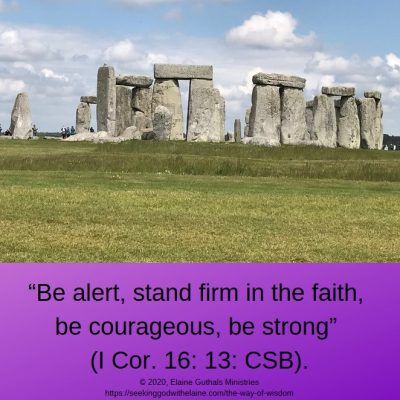Solomon gave his son a foundation on which to live his life. It was now up to the son to decide if he was going to follow Solomon’s advice or not. This devotion looks at the choices the son – and we – have in following “… the way of wisdom …” (Prov. 4: 11 ESV).
Nuggets
- We need to give our kids a foundation “… in the paths of uprightness” (Prov. 4: 11 ESV) because life is hard.
- Don’t follow a lifestyle of evil; instead, follow the Light of righteousness.
- Solomon had imparted words of wisdom – it was up to the son to follow them.

Parents have an important responsibility in raising their children. Bartlett wrote, “The true aim of parents should be the culture of a God-fearing, God-obeying, God-loving character.”
That was Solomon’s goal as he was working with his son in Proverbs. Using his advice, we can teach our kids – and ourselves.
Even if we aren’t parents, we have others whom we can teach. We have other family members, such as nieces and nephews. We may be in a mentor relationship at work. We are witnesses for Jesus as we live out our lives.
The Right Way
“I have taught you the way of wisdom; I have led you in the paths of uprightness. When you walk, your step will not be hampered, and if you run, you will not stumble. Keep hold of instruction; do not let go; guard her, for she is your life” (Prov. 4: 11-13 ESV)
Parents want what is best for their children. That is why we teach them. At some point, though, we have to let them out what we have taught into practice.
Hopefully, we have led them “… in the paths of uprightness” (Prov. 4: 11 ESV). We should be teaching them views of life and habits that lead them to Jesus.
We need to give our kids this foundation because — let’s face it — life is hard. They are going to run into a lot of struggles.
We want to make sure that they can run and not be hampered (Prov. 4: 12). We want them to be able to hurdle over the obstacles.
That is so true now that so much has changed and is continuing to change. We have to make sure our kids have sure feet.
Still, we also have to make sure our kids have a firm foundation for when they are in the ho-hums of everyday life. When things are b-o-r-i-n-g, it is easy to slip off the narrow way.
Solomon reminded us that this foundation is predicated on one thing: “… the way of wisdom …” (Prov. 4: 11 ESV). That way is Jesus.
- “Jesus answered, “I am the way and the truth and the life. No one comes to the Father except through me” (Jn. 14: 6 NIV).
- “It is from him that you are in Christ Jesus, who became wisdom from God for us — our righteousness, sanctification, and redemption” (I Cor. 1: 30 CSB).
After Jesus redeems us and we follow Him, we are on the sanctification road, which leads to righteousness. Redemption is where something is used in exchange for something else to gain or regain something. Righteousness is the result of a solid relationship with God built by a sincere life of conscientious obedience to God’s laws and commandments. Sanctification is the transformation of mind, body, and soul beginning with regeneration and ending with perfected state of spiritual wholeness or completeness.
It is up to our kids to hold on to the teachings. They have to have faith. Faith is the belief that the doctrines stated in God’s Word are true, even if we do not understand all aspects of them.
We can do a lot for our kids. We cannot accept Christ for them.
I think it is interesting here that Solomon told his son — and us — to hold on tight. Eve said she was told not to touch (Gen. 3: 3). Now, God told them they couldn’t eat from the tree (Gen. 2: 17). He didn’t say anything about touching.
Eve should have followed the no-touch, though.
So, of what do we take hold? We need to take a firm grasp on seeking God.
Searching for and Seeking God
Hearing His Word (Rom. 10: 17).
Reading His Word (Rev. 1: 3).
Praying to Him (Heb. 4: 16).
Studying His Word (Ac. 17: 11).
Meditating on His Word (Ps. 1: 1-2).
Memorizing His Word (Ps. 119: 11).
Holding fast isn’t just so we can get smarter. It is going to help us when we come upon the obstacles. We won’t as easily get knocked off track.
We are told to hold fast in several different ways.
- “Be alert, stand firm in the faith, be courageous, be strong” (I Cor. 16: 13: CSB).
- “Be strong and courageous. Do not fear or be in dread of them, for it is the LORD your God who goes with you. He will not leave you or forsake you” (Deut. 31: 6 ESV).
- “Wait patiently for the LORD. Be brave and courageous. Yes, wait patiently for the LORD” (Ps. 27: 14 NLT).
I think something that isn’t taken into account there is how hard it is to withstand Satan’s temptation. We are going to sin. I would hope that Adam could learn something from my mistakes.
We can’t just focus on teaching our children how to live in this world. Yes, that is important.
It is more important that we prepare them for eternal life. Doing that impacts what we do in this life. This life is the preparation for the next.

The Wrong Way
“Do not enter the path of the wicked, and do not walk in the way of the evil. Avoid it; do not go on it; turn away from it and pass on. For they cannot sleep unless they have done wrong; they are robbed of sleep unless they have made someone stumble. For they eat the bread of wickedness and drink the wine of violence. But the path of the righteous is like the light of dawn, which shines brighter and brighter until full day. The way of the wicked is like deep darkness; they do not know over what they stumble” (Prov 4: 14-19 ESV)
Solomon went on to tell us what not to touch — in pretty adamant terms. Don’t follow a lifestyle of evil. Instead, follow the Light of righteousness.
Solomon is calling them paths. Jesus called it a road. “Enter through the narrow gate. For wide is the gate and broad is the road that leads to destruction, and many enter through it. But small is the gate and narrow the road that leads to life, and only a few find it” (Mt. 7: 13-14 NIV).
A couple of chapters back, Solomon had already given advice about connecting with others. He was hitting that concept again, but I think he was expanding it.
It isn’t just people who will lead us astray. It is also the “… bread of wickedness and the drink of violence” (Prov. 4: 17 CSB).
Do you see what that is saying? “Dudes, you can get into trouble all by yourselves. You don’t need a tour guide.”
That is especially true when we perceive something to be as ordinary as food and drink. Hey, Sally and I are just talking about Tom. We aren’t gossiping. My pen ran out of ink on the way to work, and I have to write a check on the way home. So, I’ll just permanently borrow this pen from work.
But how far do we have to go in avoiding the path of the wicked? If we avoid sinners, we can’t witness to them. Sinners are all people who have not made a genuine profession of faith — who have not sincerely ABCDed.
The ABCDs of Salvation
If you have not become a believer in Christ, please read through the
Plan of Salvation and prayerfully consider what God is asking you to do.
A – admit our sins
B – believe His Son Jesus is our Redeemer
C – confess God as Sovereign Lord
D – demonstrate that commitment by making any changes needed in our lives to
live the way in which God has called us
The Disciple’s Job Description
Jesus was concerned about this in His prayer at the Last Supper. “I am not praying that you take them out of the world but that you protect them from the evil one” (Jn. 17: 15 CSB).
But that makes it difficult, doesn’t it? We don’t always see the line drawn in the sand. The right side is okay; the left side is really sin. When does abstinence come in, and when does moderation come in?
We don’t want abstinence to be the opposite of works. Ephesians 2:8 tells us salvation is not by works. It does not say it is by abstinence.
What Ephesians 2: 8 says is salvation is by grace. “For you are saved by grace through faith, and this is not from yourselves; it is God’s gift” (Eph. 2: 8 CSB).
The Christian Observer gave us a good indication of what we should avoid. “What we are then to avoid is unnecessary familiarity with sinners and a disposition to comply with their sins.” Our disposition is our temperamental makeup.
Hamilton explained why disciples are described as the light. He wrote, “… now he has attained to wisdom, holiness, and happiness. Light, as symbolical of the good, speaks to us of the enlightenment of the understanding, the purity of holiness, and true happiness.”
We are not called to be complacent with where we are at the time of conversion. We have to grow in grace and knowledge (II Pet. 3: 18).
At conversion, we start out as milk babies. Over the course of our lives, as we navigate the sanctification road, we are to grow into steak adults.
Thomas made a good point. We can compare the dark path to the light path based on this world. If we make the comparison based on what we know, it would be easy to choose dark over light.
We have to make the comparison through the lens of eternity. This world and its life is temporary. We must make the decision based on what is lasting.
We also have to realize that we are on the path for the long haul. That means the rest of our lives. We don’t “arrive” until we arrive in God’s presence.
Choices
“My son, be attentive to my words; incline your ear to my sayings. Let them not escape from your sight; keep them within your heart. For they are life to those who find them, and healing to all their flesh. Keep your heart with all vigilance, for from it flow the springs of life. Put away from you crooked speech, and put devious talk far from you. Let your eyes look directly forward, and your gaze be straight before you. Ponder the path of your feet; then all your ways will be sure. Do not swerve to the right or to the left; turn your foot away from evil” (Prov 4: 20-27 ESV)
Solomon had imparted words of wisdom. Now, it was up to the son — and us — to follow them.
- Choose to follow them — we find life.
- Choose not to follow them — we find death.
Yes, the son had to hear the words first. (Just because Solomon had been talking, didn’t mean son had been listening.) The son had to do the following:
- Listen closely (Prov. 4: 20)
- See them (Prov. 4: 21)
- Take them to heart (Prov. 4: 23)
We’ve talked before that obedience has to come from the heart. God’s Word is supposed to be a part of us. His laws and commandments are supposed to affect our character or our core – our heart level. If we are to engrave God’s laws and commandments on our hearts, we internalize them, and they change us.
To read a related devotion, click the appropriate button below.
Glossary
But taking it down to the heart level isn’t the end. We have to be diligent about keeping the heart pure. We are to keep out all the inappropriate pulls that tempt us.
Why is keeping our hearts pure so important? Waterland asserted that religious matters come from the heart. He wrote, “All things relating to religious conduct are reducible either to some matter of belief or practice.” Both are driven by the heart.
Then we get to the body parts section. That little tongue is an important part of our bodies. We have to make sure we use it for God.
Solomon urged his son to keep His eyes on God. He will direct our paths when we allow Him to lead.
We just have to make sure that our feet follow God’s direction. Verse 26 says we have to “ponder the path …” (CSB). We must make a conscious decision to follow God.

Making the Connections
We are to walk the path of the righteous. Maclaren called it the path of wisdom.
Instead of accessing this wisdom, worldview people walk the path of darkness. Emmons thought it was so dark, they can’t see that they are being led to ruin.
The problem is that it is a moral darkness. Oh, I bet worldview people would hotly contest that. They would list all the save the kids, save the animals, save the planet groups with which they are associated.
We can’t work our way into salvation. It isn’t about what we can do. It is about what Jesus has already done for us — which we couldn’t do ourselves.
How Do We Apply This?
Melvill gave it to us straight. He wrote, “A man is accountable for his creed as well as for his practice — accountable inasmuch as it must be through his own fault that he believes what is false just as much as it is through his own fault that he does what is wrong.”
If you have not admitted that your relationship is not right with God,
have not asked Jesus to be your Lord and Savior,
and have not confessed your sins,
please read through the Plan of Salvation and prayerfully consider what God is asking you to do.
Judgment day is coming. We will be held accountable if we have not ABCDed.
To read a related devotion, click on the appropriate button below.
There are two paths. One is a wide path that leads to the dark. In the dark is the torment of hell.
The other is a narrow path that leads to the light. In the light is the presence of a God. “Night will be no more; people will not need the light of a lamp or the light of the sun, because the Lord God will give them light, and they will reign forever and ever” (Rev. 22: 5 CSB).
How do we keep out those things which would tempt us out of our hearts? Burns gave us a list.
- Watch
- Seek God
- Exhibit joy and confidence
- Be productive in God’s work
- Be ready for what lies ahead, even death
Father God. We want to walk on the paths that lead to You. Shine Your light to show us the way. Help us to know when to witness and when to abstain. We want always to do Your will. Amen.
What do you think?
Leave me a comment below (about this or anything else) or head over to my Facebook group for some interactive discussion.
If you don’t understand something and would like further clarification, please contact me.
If you have not signed up for the email daily or weekly providing the link to the devotions and the newsletter, do so below.
If God has used this devotion to speak with you, consider sharing it on social media.
Pingback: A Steward Gone Bad – Seeking God with Elaine
Pingback: Being Content Because Our Hearts Are Right – Seeking God with Elaine